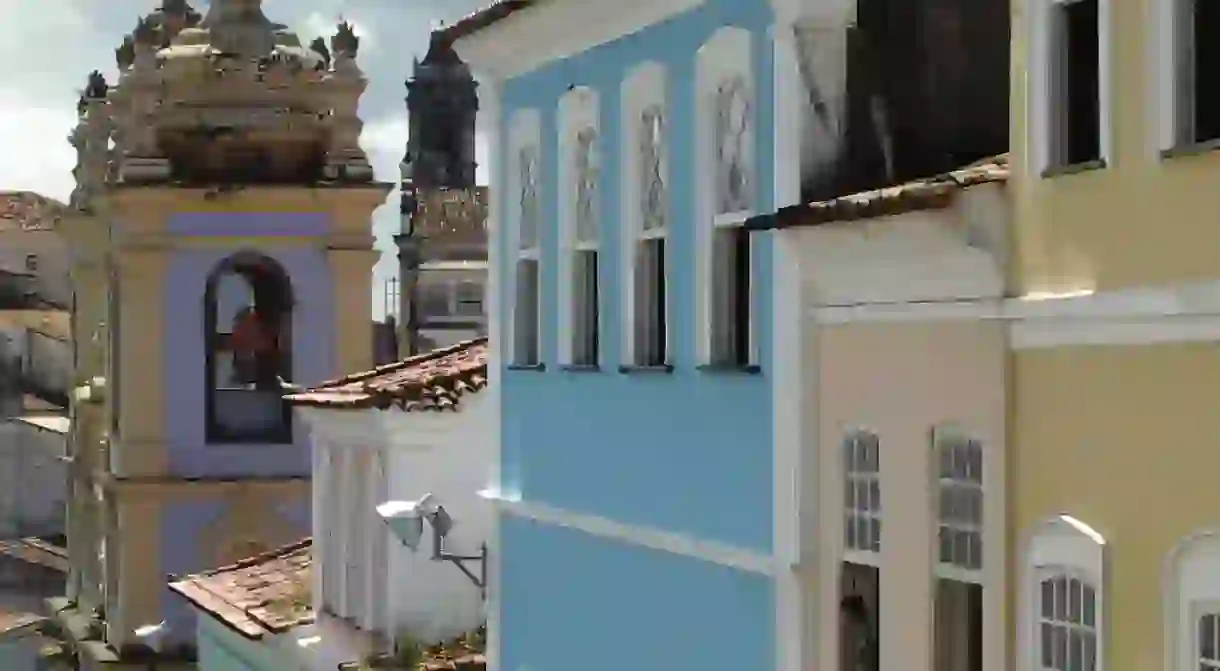The 6 Most Beautiful Buildings in Salvador

Architecturally Salvador is a city with two faces. Its older, long established neighbourhoods weigh heavy with the influence and style of European colonisers, African slave culture and centuries of wear and tear. By contrast, newer areas that stretch out towards the suburbs gleam and glisten with towers that touch the clouds and buildings that demonstrate Brazil’s architectural originality and flare. Read on to be inspired by some of the city’s most beautiful buildings.
Nossa Senhora do Rosário dos Pretos Church
Building, Church

Given the striking beauty of the buildings and the palette of glorious colours in Salvador’s historical district, it is hard to choose just one building. The Church of the Slaves, however, perfectly represents the area’s long history and the grand colonial architecture of the area. It was built by slave workers (during the night as it was their only spare time) in the 1700s and has remained a popular place of worship for the black community ever since. Painted in a pale lilac-blue, its two rococo-style bell towers match the sky and the five ornate windows on its front are framed in white stucco and stone.
Casa do Comérico
Theater, Concert Hall
Stacked like precarious red-rimmed Jenga blocks, the Casa do Comércio in Salvador is an architectural sight not to be missed. The extraordinary complex is 14 storeys high, based around two reinforced concrete towers that form an ‘H’ shape. Arranged on top is a higgledy-piggledy design of boxes made of steel. With over 5,000 metres-squared of gardens in the space, greenery overflows from its balconies. Inside there is a multi-arts performance centre and event venues, as well as hospitality school and a restaurant that is open to the public.
Mercado Modelo
Building, Architectural Landmark, Market, Bazaar

The large yellow building that houses the Mercado Modelo might not strike you as anything particularly special on arrival, but it was a prime example of neoclassical architecture in its day and it remains a handsome structure today. Inside elegant stone arches crown the alleys and streets that run through it. At the north end is a huge curved balcony, covered in umbrellas looking out to the Bay of All Saints, and underneath there is a network of brick tunnels. Over 250 stallholders sell an array of arts and crafts from Monday to Saturday – a shopping opportunity not to be missed.
Palacete das Artes
Building, Museum

The Museum of Rodin in Salvador is housed in a mini palace of pristine white and verdant gardens, built in the neighbourhood of Graça in 1912. The tall, narrow building is flanked by grand balconies held up by wide white pillars and adorned with gold decorations. Within the grounds there is a new sharply designed, concrete building that provides a sheltered wing for Café Solar and four statues by sculptor Auguste Rodin are placed around and about.
Rio Branco Palace
Building, Museum

Salvador’s palace is one of the oldest in the country having been built in 1549. It later became the seat of the state government and today, having been restored and granted UNESCO’s protection, it is still fit for a king. An imposing ornate neoclassical building, it reaches far back and is topped with a highly decorative dome and a pair of grand eagles about to take flight. It is hard to miss in the Pelourinho and is open to visitors year round.
Residencial Trapiche Adelaide
Building, Gym, Spa
Perhaps more Miami than Salvador, the Trapiche Adelaide is a chic residential building of glimmering glass and perfect lines. It sits right on the water’s edge giving the lucky few who live there private access to the sea and outstanding views of All Saints Bay. Wide balconies wrap around each floor perfecting the art of indoor-outdoor living, and facilities include a spa, gym, sea deck and infinitely pool too. Sadly, since the famous eponymous restaurant that was once on the site has closed, there is no access for the public.













